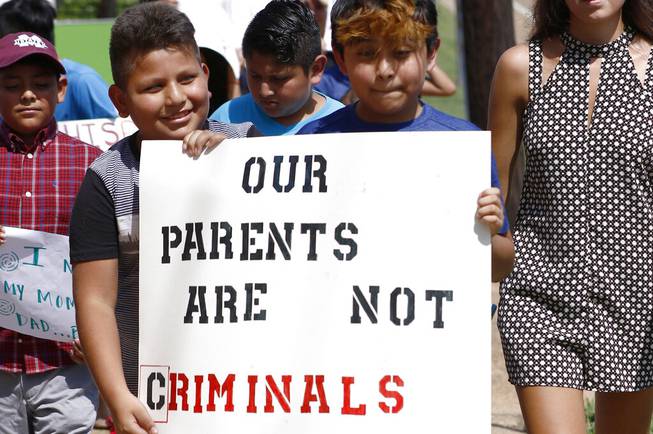
Rogelio V. Solis / AP
In this Aug. 11, 2019, file photo, children of mainly Latino immigrant parents hold signs in support of them and those individuals picked up during an immigration raid at a food processing plant, during a protest march to the Madison County Courthouse in Canton, Miss.
Thursday, Oct. 14, 2021 | 2 a.m.
View more of the Sun's opinion section
In response to the federal government putting a stop to mass deportation raids on work sites, two words spring to mind: Good riddance.
These raids, which were common under former Presidents George W. Bush and Donald Trump, were problematic on several different levels and didn’t accomplish their stated purpose of being a deterrent to the employment of undocumented immigrants in American businesses. Mainly, they were political posturing by Bush and Trump to rev up xenophobic Republican voters.
The Biden administration, in discontinuing the actions, said it would instead focus on unscrupulous employers who rely on immigrant labor but use the threat of deportation to abuse workers’ rights, pay them substandard wages and subject them to unsafe working conditions. Meanwhile, immigration violations at U.S. companies can be policed effectively through low-profile audits of employment records.
Mass raids and their aftermath, on the contrary, routinely involved racial profiling, invasive and unlawful searches, harassment and intimidation.
It wasn’t uncommon for the government to detain workers who had performed their jobs dutifully for years and caused no trouble but rather had quietly raised their families, sent their children to local schools, become members of local churches and charitable organizations, paid sales taxes and other taxes, and otherwise supported their communities. Families were traumatized by separation, including children who had been born on U.S. soil and had little to no connections to their parents’ home countries. The individuals targeted by the government were overwhelmingly Hispanic, with even U.S. citizens of Latino ethnicity being rousted.
With some of the raids resulting in dozens or even hundreds of detainments, communities suffered massive and long-lasting economic damage. Many of these roundups took place at meatpacking plants or other food-processing facilities set in small, rural towns, whose economies were crippled by the loss of residents and slowdowns or shutdowns of plants. The town of Postville, Iowa, lost nearly half of its 2,000 residents when nearly 300 meatpacking workers and their families were deported in 2008. It took years for Postville to recover, and what eventually saved the town was the influx of Somali refugees who filled vacant positions at the plant.
And what benefit came from the raids? They certainly didn’t stop employers from bringing on undocumented workers on an at-large basis.
In fact, as the coronavirus pandemic gripped the nation in 2020, Trump crassly shifted from targeting workers in meatpacking plants for deportation to declaring them essential workers and forcing them to remain on the job despite an elevated risk of COVID-19 infection.
“Immigrant workers kept the lights on in this country during a pandemic, and they were essentially told by the government they should work to death without basic rights so that others could live,” said Nadia Marin-Molina, an executive director of the National Day Laborer Organizing Network, in a statement supporting the Biden administration’s policy change. Meanwhile, the Republican presidents were much less punitive toward the business owners who employed undocumented immigrants. A prime example also comes from the 2008 raid in Postville: In 2017, Trump commuted the 27-year sentence of plant executive Sholom Rubashkin over a complex financial scheme to pay workers off the books.
“The deployment of mass work site operations, sometimes resulting in the simultaneous arrest of hundreds of workers, was not focused on the most pernicious aspect of our country’s unauthorized employment challenge: exploitative employers,” wrote current Homeland Security Secretary Alejandro Mayorkas in discontinuing the raids. “These highly visible operations misallocated enforcement resources while chilling, and even serving as a tool of retaliation for, worker cooperation in workplace standards investigations.”
Immigration enforcement at work sites is necessary, and bad actors should be rooted out. But mass raids are not the way to go about it.
